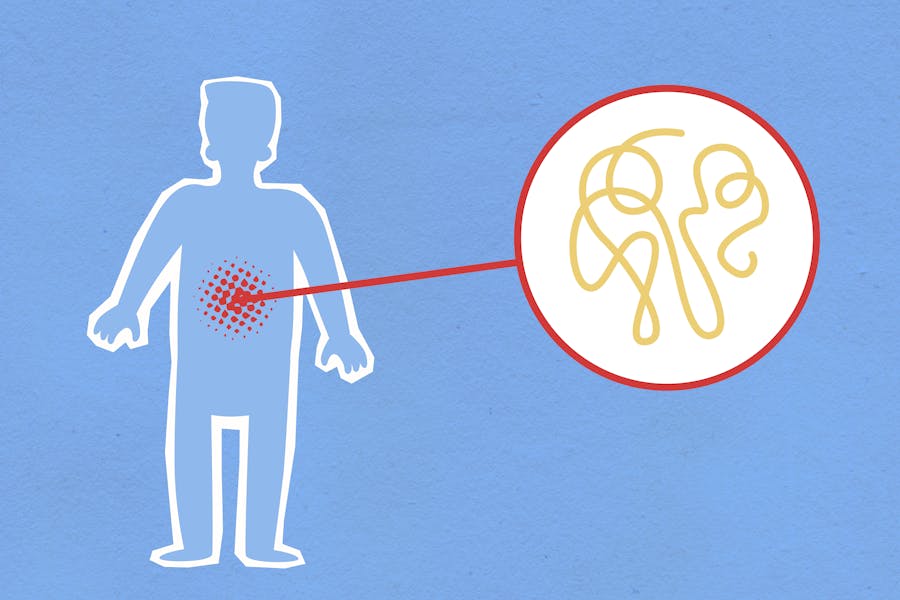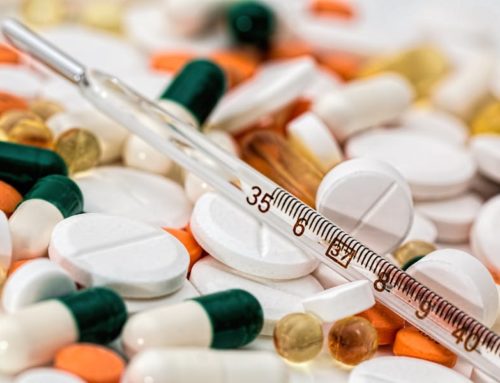Ah, those pesky toxins. They’re always working their evil magic, causing illness and pain in so many people. By now, you’re probably used to seeing patients who have been exposed to toxins in their many forms. After all, toxicity is at the root of a wide range of illnesses and leads to countless symptoms. But when toxins begin to attack our brain, they’re really playing dirty.
Now, we’ll look at the underlying chemical pathways that have resulted in toxins becoming the number-one source of brain chemistry imbalances and neurodegenerative disorders. Specifically, we’ll examine how toxins that permeate the BBB can cause inflammatory reactions in the brain, which can lead to conditions such as Alzheimer’s disease, anxiety, depression, and Parkinson’s disease. (1, 2, 3, 4, 5)
We’ll also delve into the connection between our gut microbiome and the nervous system via the gut-brain axis. Altogether, toxicity in the gut and brain and the resulting inflammation can have a direct impact on how well both our brains and nervous systems function. (6, 7)
The General Effects of Toxicity on the Body
One of the main reasons that toxins are so damaging to the body in so many ways is that they interfere with mitochondrial function, downregulating cellular processes and inhibiting energy production. (2, 3, 8, 9)
Another reason for the many destructive effects of toxins is the fact that they can cause inflammation. Toxicity normally affects the initial point of exposure first — the lungs and sinuses if toxins are breathed in, on the skin if the exposure is topical, or in the digestive system if the toxin is ingested through food or drink. (10, 11, 12, 13)
But as the drainage organs and immune system all work to respond to or eliminate these poisons, inflammation can spread throughout the body and become systemic.
How Toxins Affect the Brain
The brain requires a great deal of energy to function at its prime. Every brain cell has at least 10,000 mitochondria, and sometimes as many as two million, to meet those energy needs. That means that when mitochondrial function — and therefore energy production — is jeopardized due to toxicity, the brain won’t receive sufficient energy supplies. Nervous-system dysfunction can result. (2, 3, 8, 9, 14)
Symptoms of toxicity in the brain
The amount of toxic exposure determines the type and severity of symptoms. The greater the levels of toxicity and the longer the exposure, the greater the mitochondrial dysfunction and downregulation — and as a result, the more troublesome the brain’s reactions become. (2, 3, 8, 9)
Early signs of brain toxicity may include: (15, 16, 17, 18, 19, 20, 21, 22, 23, 24, 25, 26)
- Anxiety
- Brain fog
- Chronic fatigue
- Depression
- Headaches and/or migraines
Later signs can include: (27, 28, 29, 30, 31, 32, 33, 34, 35, 36, 37, 38)
- Alzheimer’s disease
- Autism
- Obsessive-compulsive disorder (OCD)
- Parkinson’s disease
Toxins in the Gut Also Harm the Brain
Because of the gut-brain axis, toxins in the gut can eventually reach and irritate the brain. For example, certain toxins are increasingly recognized for their adverse neurological effects. And it’s likely that it all starts in the gut. Similarly, certain digestive conditions, such as irritable bowel syndrome (IBS), have been shown to be correlated with anxiety and depression. (6, 7, 39, 40, 41)
Under normal circumstances, bacteria and fungi in our gut consume and eliminate many unwanted substances and pathogens. But when these friendly microbes are exposed to toxins, they either die off or change form (aka pleomorph) into bad or infectious pathogens. (6, 42, 43, 44, 45)
Glyphosate is one such toxin that affects the microbiota in our gut. It is a broad-spectrum herbicide that is the primary ingredient in the weed killer Roundup. Because it is so prevalent in the environment, exposure is common. And it gets on our crops and into our food supplies so that we easily ingest it. (46, 47, 48, 49)
Glyphosate has many repercussions on our health. For example, inside the gut, it can act as an antibiotic, destroying the good bacteria in our digestive system and allowing other, less-beneficial microbes to flourish. That leaves our gut open to threatening bacteria and parasites, many of which end up triggering inflammation. (46, 47, 48, 49, 50)
As a result of this inflammation in the gut, the body thinks something is wrong and goes into self-preservation mode. The inflammatory compound histamine is released to alleviate any potential infection. This histamine then travels through the system as it tries to activate immune system cells throughout the body. (5, 51)
The histamine also attempts to make the BBB more permeable so that immune-system cells can penetrate the barrier and reach the brain to protect it. But unfortunately, an incapacitated BBB allows plenty of other dangerous substances to pass through, including toxins. (5, 51)
The Role of Mast Cells
If there is too much inflammation in the gut or elsewhere in the body, mast cells will be activated. Mast cells help the immune system function properly and fight disease. For example, one of the mast cells’ jobs is to dilate blood vessels in areas of injury or illness, opening the way for immune cells to migrate into infected tissues. (5, 7, 52, 53, 54, 55)
Other times, mast cells step in to assist in wound healing by causing the blood vessels to constrict. Vasoconstriction helps prevent blood loss. It also protects by slowing the movement of microbes, parasites, or toxins into the bloodstream. If allowed to enter the blood, these things can spread throughout the body and cause widespread damage. (52, 53, 54, 56)
Mast cells and inflammation
Excess mast cells in various organs, including the bone marrow, digestive tract, or skin, is a condition known as systemic mastocytosis. As they are triggered, the mast cells release substances such as histamine and cytokines, resulting in symptoms similar to those of an allergic reaction. Severe inflammation may occur, leading to potential organ damage. (5, 57, 58, 59, 60, 61, 62)
In some patients, this heightened mast cell response leads to a regular manifestation of these sorts of allergy-like symptoms. That is why some people end up with sensitivities to certain foods, supplements, or other substances. (5, 55, 57)
For some people, food sensitivities can be especially dangerous. Not only do they cause allergic reactions and digestive problems, but they can also alter brain chemistry and affect the BBB and the brain. (63, 64, 65, 66, 67)
If someone experiences severe or chronic stress or has toxins in the gut, this will cause the mast cells to react by continually producing histamine and cytokines. And a pro-inflammatory cycle will occur: Inflammation leads to mast-cell activation, which produces more histamine and cytokines, which results in additional inflammation. Then the cycle repeats. (5, 7, 57, 58, 59)
The Dangers of a Weakened BBB
Long-term elevated levels of histamine can cause the BBB to become even more permeable. Without proper protection by this barrier, toxins can easily access the brain and nervous system. (51, 60, 61)
An impaired BBB becomes a free-for-all for harmful toxins and pathogens. We looked at some of the most dangerous offenders in our previous article, but here’s a brief recap:
- EMFs: Whoever warned us that talking on our cell phones could cause brain damage wasn’t wrong.
EMFs from our computers, microwaves, phones, TVs, WiFi routers, and other devices can interfere with the body’s own signaling systems and energy and cause many health issues. They can also puncture the BBB and allow harmful elements to seep in. Anxiety, depression, and tumors are just a few of the brain-related ailments that EMFs may cause. (62, 63, 64, 65) - Environmental toxins: It’s a chemically charged world. With 3 billion pounds of toxic chemicals being dumped into the environment annually and 84,000 different types of chemicals used just in this country, it’s hard to avoid chemical exposure. And that means that the brain is at constant risk. (1, 2, 3, 4, 66, 67, 68, 69, 70)
Take glyphosate, for instance. We looked at what it does to the gut, but it is equally dangerous for the brain. Glyphosate causes inflammation and cellular damage in the brain and elsewhere. It also may hinder mitochondrial function that is so important for brain health. (46, 47, 48, 49)
Glyphosate is so comfortable in our heads that it hangs out there and fully integrates itself into the brain tissue. This chemical is able to alter the formation of collagen, which is necessary to form connective tissue in the brain, allowing it to become a part of the brain’s actual structure, making it very hard to remove. (46, 47, 48, 49)
Toxic heavy metals are also bad for the brain. Aluminum can kills brain cells, lead can interrupt mitochondrial function, and mercury can be very cerebrally toxic. (1, 71)
The end result is a range of disorders, including Alzheimer’s, aggression, dementia, depression, Parkinson’s, and suicidal ideation. - Food sensitivities/allergies: Food sensitivities have been shown to influence the brain. If someone eats something (think dairy, gluten, soy, or sugar, among others) that causes them to have a reaction, the impact extends far beyond the gut to the brain and even the entire body.
As previously mentioned, food sensitivities can lead to changes in brain chemistry and a leaky BBB, thus making people with food allergies more susceptible to cognitive and neurodegenerative disorders. (63, 64, 65, 66, 67)
In a study, researchers induced a dairy (cow’s milk) allergy in mice and found that the allergic mice began to develop autism-like behaviors. They also ended up with significantly different gut microbiota than control mice, supporting the link between gut bacteria and neurological disorders such as autism. (63) - Lyme disease and coinfections: You’re probably familiar with Lyme disease and its sidekick infections caused by the bacteria Bartonella, babesia microti, and B. burgdorferi. Following a tick bite, Lyme bacteria can cause immune system dysfunction, brain and spinal cord inflammation, and nervous-system infection, along with many other ailments. (72, 73, 74)
Their effects on the brain can result in cognitive, emotional, and related issues, ranging from brain fog to major memory loss, paranoia to panic attacks. (75, 76, 77, 78)
- Mycotoxins: Not just in mold anymore, these living toxins produced by fungi are also found in the air we breathe, the beverages we drink, and the food we eat. (79, 80, 81, 82, 83)
Mycotoxins endanger the brain by slowing mitochondrial function and causing imbalances in brain chemistry. This means that mold toxicity and mycotoxins can cause brain, cognitive, and neurodegenerative disorders such as Alzheimer’s, autism, depression, multiple sclerosis, and schizophrenia. (79, 80, 81, 82) - Parasites: Certain parasites have a real affinity for the brain. And when they get in there, they can mess up brain chemical and neurotransmitter production and cause a variety of mental and brain-related issues. They’re able to do this by crossing the BBB, causing inflammation, and weakening the immune system. (6, 50, 83, 84, 85, 86, 87, 88)
Parasites such as Clostridioides difficile, cytomegalovirus, H. pylori, Toxoplasma gondii, and others have been linked to such conditions as autism, depression, OCD, psychosis, suicidal thoughts, and Tourette’s, just to name a few. (6, 83, 84, 85, 86, 87, 88)
How to Protect the Brain and the BBB
Parasites and toxins are constantly on the attack when it comes to the brain. But there are things you can do to help build your patients’ blood-brain barrier to keep those things out, and support and restore brain health and function.
Traditional medicine suggests the use of probiotics to fix gut damage and reverse or prevent nervous-system damage. But that is just one of many possible approaches. (89)
In our previous brain article, we listed several other potential methods to bolster brain health and the BBB. These included:
- Being aware of any genetic predispositions for brain or nervous disorders
- Eating a nutritious diet rich in brain-healthy foods
- Focusing on drainage and detox
- Getting enough good-quality sleep
- Keeping the gut healthy
- Limiting exposure to EMFs
- Making sure blood sugar levels are balanced
- Reducing alcohol consumption
- Stimulating the vagus nerve
- Taking supplements
- Thinking positively
Sleep is especially important because it’s when we sleep that the brain drains, eliminating toxins and waste (through the glymphatic system) such as amyloid-beta, which is a peptide that may be linked to neurodegeneration. The brain also rests and recovers while we’re asleep. (90, 91, 92, 93, 94, 95)
Getting proper sleep can provide immune support and help fight inflammation, and it’s during sleep that the brain produces melatonin. Melatonin is known to protect the brain and strengthen the BBB. (92, 93, 96, 97)
Head First
For obvious reasons, the brain is one of our most important organs. So we need to do what we can to protect it. The skull and the BBB are useful allies in the battle for brain health, but we can also do our part by eliminating brain-hungry toxins, fighting brain and systemic inflammation, and maintaining good gut health.
If your patients come to you with mental or neurodegenerative disorders, there are many ways to help them. Encourage lifestyle changes, proper drainage, or relevant products, and let being healthy go to their head.







